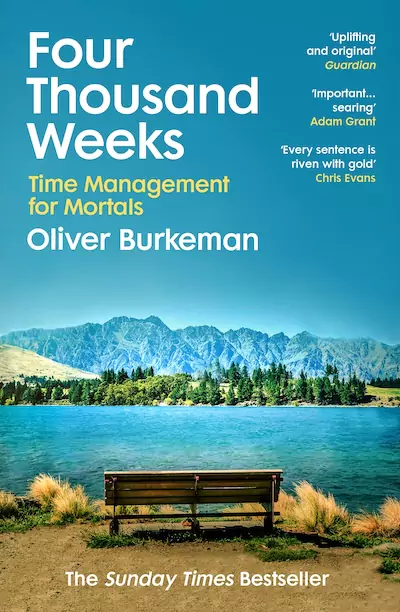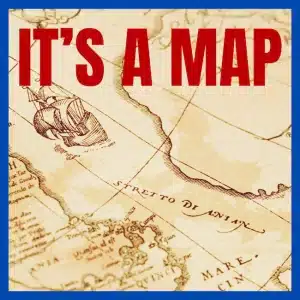If you live to 80, you get about 4,000 weeks on this planet. That’s it. Not 40,000. Not 400,000.
Four. Thousand. Weeks.
But that’s a total from when you were born. If you’re currently 20 years of age, that’s only 3000 weeks left. If you’re 40, that’s only 2000 weeks left. And if you’re 60, like me, that’s only 1000 weeks left.
When I first heard that, it stopped me in my tracks. Only 1000 weeks left. That’s not very long.
And that presumes I make it to 80.
Suddenly, time doesn’t feel abstract anymore. It feels real. Finite. And honestly… urgent.
Oliver Burkeman: Four Thousand Weeks – Time Management for Mortals
This idea comes from Oliver Burkeman’s book Four Thousand Weeks: Time Management for Mortals — and it completely changed how I think about time, work, and life.
Let me share the 5 biggest lessons I took from it — and how they might just change the way you live the rest of your weeks.
1 Time Management is a Lie
Burkeman starts with a simple but shocking truth:
Most time management advice is built on a lie.
The lie? That if we just find the right system, app, or planner… We’ll finally get everything done. Life will be organised. We’ll feel calm. In control.
But it never works. Because the to-do list always fills back up. Even if you finish it today, there will always be more to do tomorrow.
Burkeman calls this the efficiency trap — the better you get at getting things done, the more things come at you. You’re not freeing up time. You’re just becoming more available to others’ priorities.
2 My Obsession with Time Management and Productivity

Let me be honest. I’ve been obsessed with productivity and getting things done.
I created a coaching course called Project Done. I ran that for three years, helping people get things done.
I’ve written 4 books about it – Done, Weekly Done 1 and 2, The Done Game Plan.
And I’ve professed my love of the Pomodoro Technique in my videos. I still design my day and work in 30-minute blocks.
But even as I was doing more than ever, it still felt like I was falling behind.
And worse… I didn’t feel better. I felt busier. More anxious. Like life was speeding up, and I was just sprinting to keep up.
Burkeman helped me see the problem: I was treating time like an opponent in a game of football that I had to defeat. Instead, I should have treated it like I partner that I loved and cherished.
3 Embrace Your Limits

You will never read every book. You won’t reply to every email. You won’t master every skill or chase every dream.
And strangely… that’s liberating.
Because once you accept you can’t do everything, you finally give yourself permission to focus on what matters most.
4 JOMO
Burkeman calls this “the joy of missing out.” JOMO
Instead of fearing what you’ll miss, choose what you’ll miss.
Say no more often. Set boundaries. Let go of being “on top of everything.”
Not because you’re lazy. But because you’re wise enough to know your time is precious, and you want to use it well.
5 Presence Over Perfection
One of my favourite lines from the book is this:
“The real problem isn’t that we’re bad at time management. It’s that we’re trying to manage something that can’t be managed.”
You can’t “control” time. You can only experience it. Moment by moment.
So be here. Now. Not someday. Not “after you get through the list.”
Life is not a project you’ll complete. It’s a moment you’re living right now.
Recently, I went house-sitting at a mate’s place for a few days. I took my computer, my video gear and a ton of books to read. I was going to get so much done.
But for the first few days, I did nothing. I took his dog for a walk. I watched Netflix. And I had a nap in the afternoon.
And you know what? The world didn’t fall apart. In fact… I felt more alive in those few days than I had in weeks. Because I wasn’t trying to optimise time. I was simply living it.
The Big Question
So here’s the question Burkeman invites us to ask: What will you do with your 4,000 weeks?
Not in theory. In practice. This week. Today.
What could you say no to, so you can say yes to what really matters? I’m saying no to evening TV so I can paint watercolours.
What would it look like to stop rushing… and start being?
You’ll never get to the end of your life and wish you’d answered more emails.
But you might wish you had watched more sunsets. Said yes to that creative idea. Or just paused long enough to notice you were alive.
Your Invitation
If this resonated, here’s your invitation:
Don’t just manage time. Honor it. Live it. Choose it.
Because your time is the most meaningful thing you’ve got.
More on Living a Meaningful Life
To dig deeper on how to live a meaningful life, read these posts next:
- Best Life! How To Master The Art Of Intentional Living
- Determine Your Core Life Values in 3 EASY Steps
- Write a Personal Manifesto – Seven Ways to be Inspired



